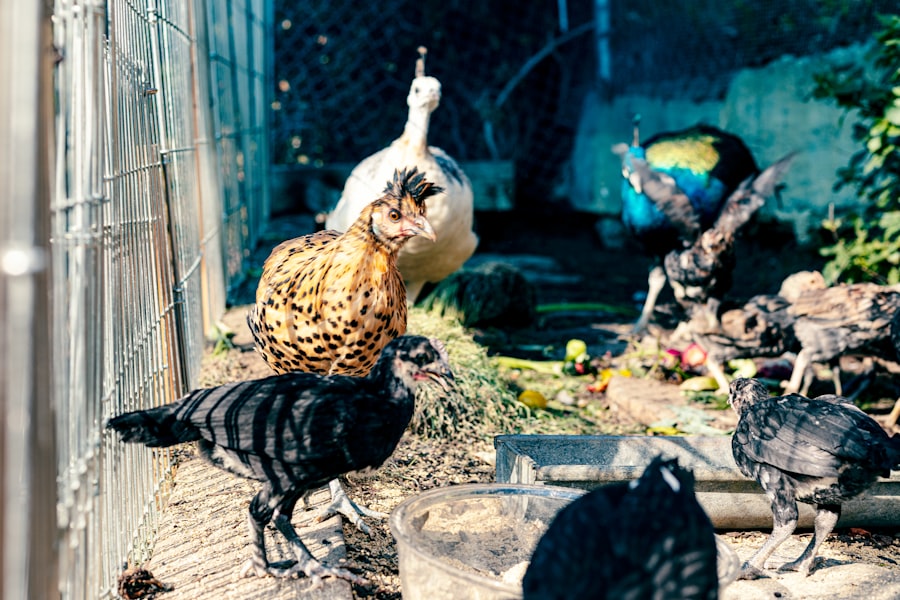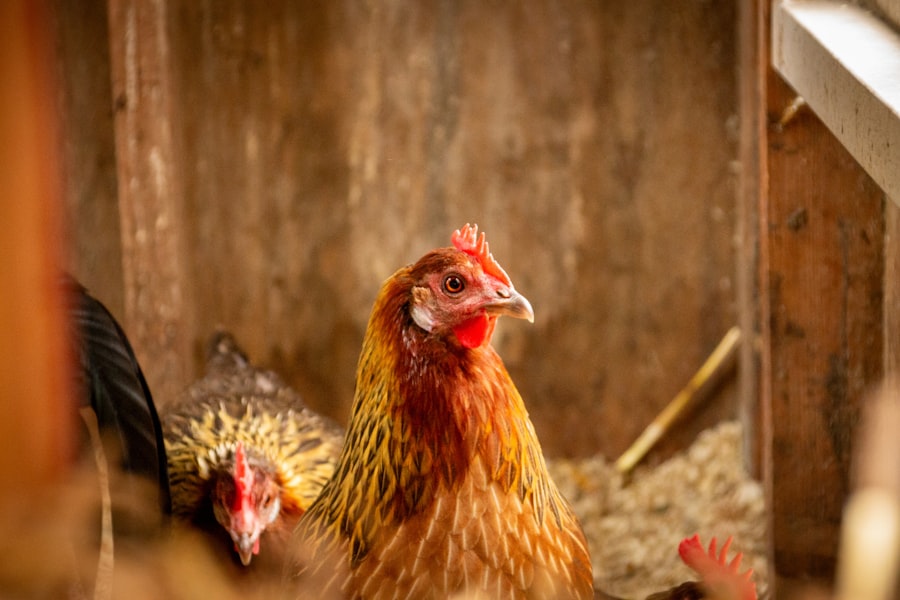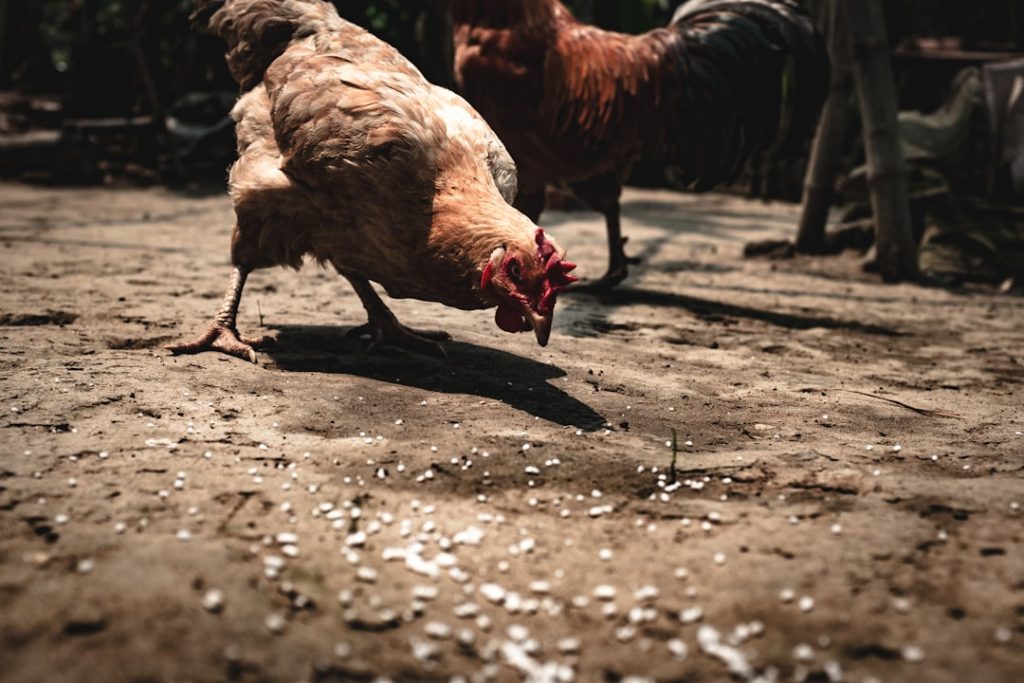In order to effectively protect your flock of chickens, it is crucial to understand the potential threats they face. Predators come in many forms, including foxes, raccoons, coyotes, birds of prey, and even domestic dogs. Each predator has its own unique hunting behaviors and methods of accessing a chicken coop.
For example, foxes are known for their cunning and ability to dig under fences, while raccoons are adept at opening latches and breaking into coops. By familiarizing yourself with the specific predators in your area and their behaviors, you can better prepare to defend your flock. Furthermore, it is important to recognize that predators may be more active during certain times of the year or under specific conditions.
For example, during the spring and summer months, when food is more abundant and predators may be feeding their young, there may be an increase in predator activity. Additionally, extreme weather conditions or disruptions to the local ecosystem can also lead to changes in predator behavior. By staying informed about these patterns and adapting your security measures accordingly, you can better protect your chickens from potential threats.
Table of Contents
- 1 Secure Coop Design: Fortifying Your Chicken’s Home
- 2 Nighttime Safety Measures: Protecting Your Flock After Dark
- 3 Guardian Animals: Using Dogs or Alpacas as Deterrents
- 4 Electric Fencing: Creating a Barrier Against Predators
- 5 Secure Waste Management: Removing Attractive Food Sources
- 6 Vigilance and Monitoring: Keeping an Eye on Your Flock’s Safety
- 7 FAQs
Key Takeaways
- Understanding the threat: Knowing the predators in your area is crucial for protecting your flock.
- Secure coop design: Building a strong and secure chicken coop is essential for keeping your chickens safe.
- Nighttime safety measures: Implementing measures to protect your flock from predators during the night is important for their safety.
- Guardian animals: Using dogs or alpacas as deterrents can help protect your flock from potential threats.
- Electric fencing: Creating a barrier against predators with electric fencing can be an effective way to keep your flock safe.
Secure Coop Design: Fortifying Your Chicken’s Home
Designing a Secure Coop
A crucial step in safeguarding your flock is to ensure their coop is secure and predator-proof. This begins with the design and construction of the coop itself. The coop should be built with sturdy materials and include features such as heavy-duty wire mesh, locks on doors and windows, and a solid roof to prevent predators from gaining access from above.
Additional Security Measures
In addition to a secure coop design, it is essential to bury wire mesh around the perimeter of the coop to prevent predators from digging underneath. Furthermore, consider the layout of the coop and run area. Providing multiple levels of security, such as an outer run area enclosed with wire mesh and an inner coop with a solid door, can add an extra layer of protection.
Regular Maintenance and Inspection
Regularly inspecting the coop for any signs of wear or damage is also crucial, as even small holes or weak spots can provide an entry point for predators. By investing in a well-designed and secure coop, and regularly maintaining it, you can significantly reduce the risk of predator attacks on your flock.
Nighttime Safety Measures: Protecting Your Flock After Dark

Predators are often most active at night, making it crucial to implement nighttime safety measures to protect your flock while they are roosting. One effective method is to install automatic coop doors that close at dusk and open at dawn, keeping your chickens safely locked inside during the most vulnerable hours. Additionally, consider adding motion-activated lights around the coop to deter nocturnal predators such as raccoons and foxes.
Another important consideration is the placement of perches within the coop. Ensure that perches are positioned away from windows and doors to prevent predators from reaching in and grabbing sleeping chickens. It is also advisable to use solid doors with secure locks rather than flimsy materials that can be easily manipulated by predators.
By implementing these nighttime safety measures, you can significantly reduce the risk of predator attacks while your chickens are at their most vulnerable.
Guardian Animals: Using Dogs or Alpacas as Deterrents
Guardian animals such as dogs or alpacas can be valuable assets in protecting your flock from predators. Dogs are natural protectors and can be trained to patrol the perimeter of the coop and deter potential threats. Breeds such as Great Pyrenees, Anatolian Shepherds, and Maremmas are known for their protective instincts and make excellent guardian dogs for flocks of chickens.
Alpacas, on the other hand, are known for their territorial nature and can be effective at deterring predators through their presence alone. When introducing a guardian animal to your flock, it is important to properly socialize them with the chickens and provide them with adequate training and supervision. Additionally, consider the specific needs and behaviors of the guardian animal when designing your coop and run area.
For example, dogs may require a secure area within the coop where they can rest and seek shelter, while alpacas may need access to a larger grazing area. By carefully selecting and integrating a guardian animal into your flock management plan, you can add an extra layer of protection against potential predators.
Electric Fencing: Creating a Barrier Against Predators
Electric fencing is a highly effective deterrent against predators and can be a valuable addition to your security measures. When properly installed, electric fencing delivers a mild shock to any predator that attempts to breach the perimeter, effectively discouraging them from attempting to access the coop or run area. Electric fencing can be particularly effective against ground-dwelling predators such as foxes and raccoons, as well as aerial predators like birds of prey.
When installing electric fencing, it is important to carefully follow safety guidelines and ensure that it is properly grounded to prevent accidental shocks to humans or other animals. Additionally, regularly inspect the fencing for any signs of damage or malfunction, as even a small break in the circuit can render it ineffective. By incorporating electric fencing into your security measures, you can create a powerful barrier against potential predators and significantly reduce the risk of attacks on your flock.
Secure Waste Management: Removing Attractive Food Sources

Secure Feed Storage
Leftover food scraps and spilled feed can attract predators to your coop, increasing the risk of an attack on your flock. To minimize this risk, implement secure waste management practices such as using tightly sealed containers for feed storage and regularly cleaning up any spilled food or debris around the coop.
Compost Pile Placement
Additionally, consider the placement of compost piles or other waste areas in relation to the coop. These areas should be located at a safe distance from the coop to prevent them from attracting predators.
Reducing Predator Activity
By removing attractive food sources from around the coop and implementing secure waste management practices, you can significantly reduce the likelihood of predator activity in the vicinity of your flock.
Vigilance and Monitoring: Keeping an Eye on Your Flock’s Safety
Finally, maintaining vigilance and regularly monitoring your flock’s safety is essential for effective predator prevention. This includes conducting regular inspections of the coop and run area for any signs of damage or potential entry points for predators. Additionally, keep an eye out for any unusual behavior in your flock that may indicate the presence of a predator in the vicinity.
Consider installing security cameras around the coop to provide continuous monitoring of your flock’s surroundings. This can help you identify any potential threats and take proactive measures to protect your chickens. Furthermore, consider enlisting the help of neighbors or community members to keep an eye on your flock when you are away.
By remaining vigilant and actively monitoring your flock’s safety, you can quickly respond to any potential threats and ensure the ongoing protection of your chickens. In conclusion, protecting your flock from predators requires a multi-faceted approach that includes understanding potential threats, fortifying the coop design, implementing nighttime safety measures, utilizing guardian animals, incorporating electric fencing, managing waste effectively, and maintaining vigilance through regular monitoring. By taking these proactive measures, you can significantly reduce the risk of predator attacks on your flock and provide them with a safe and secure environment to thrive.
If you’re looking for more tips on keeping your chickens safe from predators like foxes, check out this article on poultrywizard.com. They offer valuable advice on how to secure your chicken coop and protect your flock from potential threats. It’s important to be proactive in safeguarding your chickens, and this article provides helpful insights on how to do just that.
FAQs
What are the main threats to chickens from foxes?
Foxes are known to be a common predator of chickens. They are skilled hunters and can easily access chicken coops and runs to prey on chickens.
How can I protect my chickens from foxes?
To protect chickens from foxes, it is important to secure the chicken coop and run with sturdy fencing and wire mesh. Additionally, installing motion-activated lights or alarms can help deter foxes from approaching the coop.
Are there any natural deterrents for foxes?
Some natural deterrents for foxes include using strong-smelling substances such as garlic or predator urine around the coop, as well as keeping guard animals like dogs or geese to help protect the chickens.
What should I do if I suspect a fox is targeting my chickens?
If you suspect a fox is targeting your chickens, it is important to take immediate action to secure the coop and run, and consider setting up traps or contacting local wildlife authorities for assistance.
Are there any specific breeds of chickens that are more fox-resistant?
While no chicken breed is completely immune to fox attacks, some breeds are known to be more alert and better at evading predators. Breeds such as the Rhode Island Red, Sussex, and Plymouth Rock are often considered to be more vigilant and better at protecting themselves from foxes.
Meet Walter, the feathered-friend fanatic of Florida! Nestled in the sunshine state, Walter struts through life with his feathered companions, clucking his way to happiness. With a coop that’s fancier than a five-star hotel, he’s the Don Juan of the chicken world. When he’s not teaching his hens to do the cha-cha, you’ll find him in a heated debate with his prized rooster, Sir Clucks-a-Lot. Walter’s poultry passion is no yolk; he’s the sunny-side-up guy you never knew you needed in your flock of friends!







